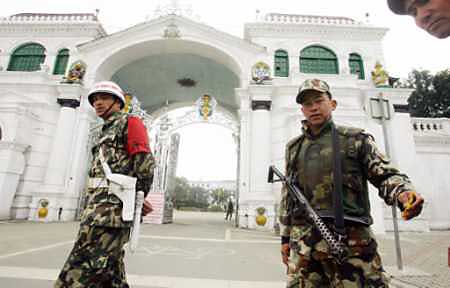URGENT News from Nepal
Jon | 04.02.2005 12:01 | Analysis | Repression | Social Struggles | Cambridge | World

Photo: Nepalese Soldiers in Kathmandu Feb 2
Subject: news digest from Kathmandu, Friday, Feb 4, 2005, 11am
Location: Kathmandu, Nepal
Date: Friday, February 4, 2005
At 10am on Tuesday, February 1, 2005, Nepal's King Gyanendra gave a televised address in which he sacked the country's coalition government, dissolved the ministries and suspended fundamental rights under a State of Emergency. Citing Article 127 of the Constitution of the Kingdom of Nepal, 1990, the King constituted a council of ministers under his own chairmanship.
During his 40-minute speech to the nation, he heaped scorn upon Nepal's political parties for allegedly destroying the country's infrastructure. According to the King, despite having had adequate opportunities to resolve the state's ongoing conflict with Maoist insurgents, or call an election, the political parties had failed the people of Nepal. Laying claim to the glorious history of the Shah dynasty, Gyanendra stressed the age-old relationship between King and subjects and promised to restore multi-party democracy within three years.
As the speech came to a close around 10:40am, all fixed and mobile telephone lines were cut, and non-satellite internet connections were down by the end of the day. By noon, the Kathmandu Valley was effectively sealed off from the rest of Nepal and the outside world: Tribhuvan International Airport was closed, with all incoming flights diverted elsewhere, and the main road arteries out of the Valley were blocked by security forces.
Despite these draconian measures, the city was calm, with most shops remaining open through the end of the business day. There were rumours of a curfew, which sent schoolchildren scurrying home in the mid-afternoon, but these were unfounded. Armed security forces in riot gear were deployed across the city, and there was little obvious protest against the King's move.
Many citizens said they were relieved that the King had taken control, stating that there was no other way out of the political stalemate that has crippled the country for the last several months. To them, Gyanendra's move was a brave risk, which would either see the King's previously mixed reputation cleared, or destroyed once and for all. There were also many sceptical voices, who feared a return to Panchayat era secrecy and the repeal of liberties hard-won over the last fourteen years of democratic process.
By Tuesday evening, there was no sign of communications returning, and people gathered what information they could from their colleagues, neighbours and friends. In discussions with Nepali journalists and academics, foreigners in official and diplomatic positions in Kathmandu, conflict monitoring groups and the media, we learned that the leaders of major political parties, trade unions and student organisations were under house arrest or taken to one of six major detention centres around the valley. Captains and majors of the Royal Nepal Army were stationed in the editorial offices of all national dailies in order to censor the morning editions before they were put to bed.
On Wednesday, many of the foreign missions based in Kathmandu issued statements. They had been taken by surprise by the royal-military coup, and the United Nations, Unites States, United Kingdom, the Council of the European Union and India all expressed varying degrees of strongly-worded concern. Indian Prime Minister Manmohan Singh said that he would not attend the SAARC summit scheduled for the coming week in Bangladesh as a vote of protest against 'political turmoil' in the region. Only China was reported to have accepted the King's power grab without critique, stating that it would not pass judgement on Nepal's internal affairs. Prachanda, Chairman of the Communist Party of Nepal (Maoist), issued a passionate statement dated February 1 condemning the King's action and calling upon 'pro-people forces' in the country to join with the Maoists to topple the monarchy and build a republic. The Maoists reiterated their call for a three-day national strike, which had predated the royal proclamation.
Judging by the traffic on the streets on Thursday morning, the Maoist call was not heeded, which many saw as an indication of King Gyanendra's influence over the populace and iron grip over the nation's capital. Outside of Kathmandu, the Maoist strike was apparently observed. Reports started to trickle in from the rest of the country, thanks to limited road travel in private vehicles and a brief reprieve in the communications blackout (landlines were turned on for one to two hours each evening, but internet servers, cellular phones and international lines remain blocked).
Specific events reported by reliable sources include a student demonstration at Prithvi Narayan Campus in Pokhara which was fired on by a military helicopter gunship leaving several protestors badly injured if not dead; the blocking of all FM radio broadcasts outside of Kathmandu and the instruction to those broadcasting in Kathmandu to play only entertainment-oriented programmes; the BBC FM station recently established in Kathmandu being forbidden from broadcasting the news in Nepali; the closure of news stands outside of the Valley; and a 72-hour blockade on long-distance public bus travel in and out of Kathmandu.
As of writing on Friday morning, the communications network remains down. Journalists and human rights activists are concerned that they will be the next targets for arrest now that most political leaders have been muted. It remains to be seen how wide the web of detentions will be, but there is a sense of powerlessness and foreboding for the future among those who have previously expressed criticism of the state in any way.
** Please circulate this news widely to encourage international scrutiny of the repression of the Nepali people **
Jon
 e-mail:
u29jp2@abdn.ac.uk
e-mail:
u29jp2@abdn.ac.uk
Comments
Display the following 5 comments